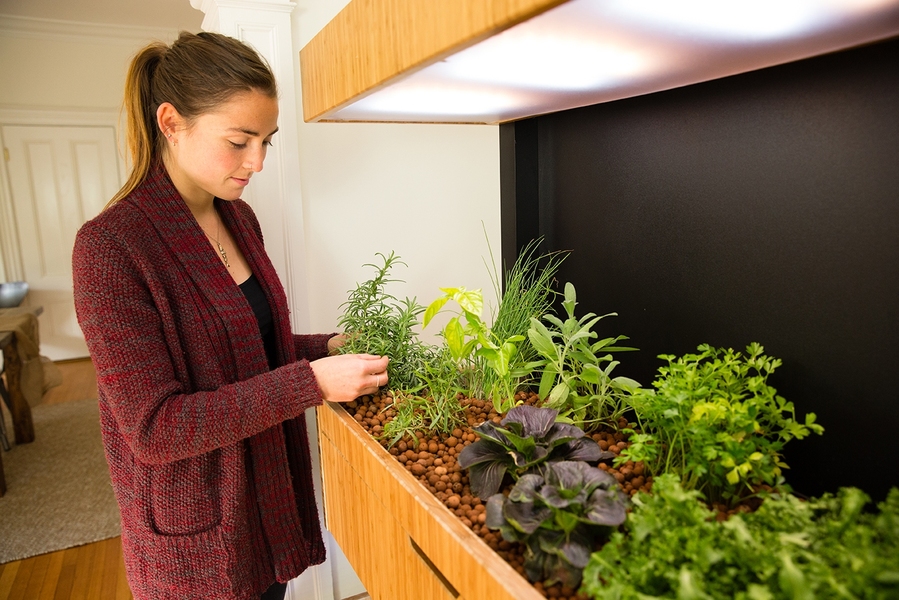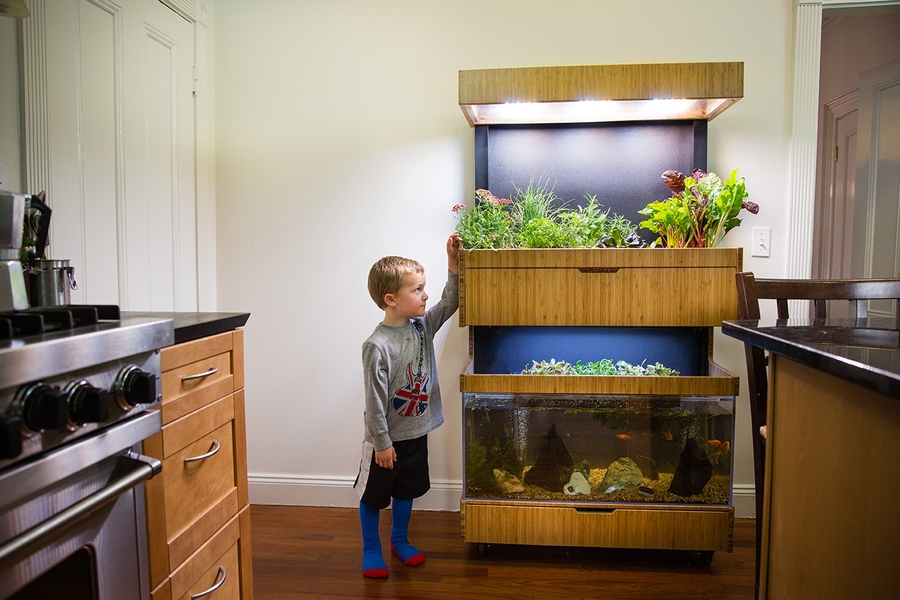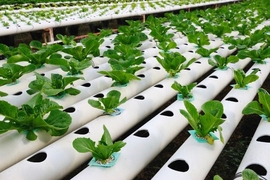Gabe Blanchet ’14 and Jamie Byron ’13 are determined to impact the future of food and influence the way people source and consume it. Driven by their shared love of nature, healthy, sustainable foods, and a desire to change the world, the co-founders of eco-startup Grove, based in Somerville, Massachusetts, engineered an intelligent gardening appliance that enables people to grow their own fresh, nutrient-rich vegetables, herbs ,and small fruits indoors year-round.
Composed of three layers contained in a cabinet the size of a bookshelf — LED grow lights on top, gardening bed in the middle, and aquarium on the bottom — the Grove Ecosystem utilizes the natural process of aquaponics, which harnesses the existing relationship between fish, plants, and beneficial microbes. The ammonia-rich fish waste is converted to nitrates, which simultaneously supplies plants with nutrients and fish with clean water. All the parts work together to grow a variety of produce such as kale, arugula, cilantro, thyme, sugar peas, tomatoes, and strawberries. The system also contains sensors for air and water temperature, humidity, and water level, so users can adapt to their fish and plants’ ideal environment, view progress, record growth, and diagnose problems through a mobile app on their phone.
Blanchet and Byron conceived of the idea for the Grove Ecosystem when they were roommates during their senior year at MIT studying mechanical engineering and aerospace engineering, respectively. “What began as an indoor gardening experiment in our Sigma Chi fraternity room soon turned into a central gathering spot for friends. The early iterations of the ecosystem provided fresh food, ambiance, clean air and a great conversation-starter. We soon realized that we had stumbled on something really special,” Blanchet says.
Blanchet, who left MIT during his sophomore year to thru-hike the Appalachian Trial, attributes his entrepreneurial spirit gained from his experience trekking the 2,182-mile path. “In hiking, there’s a saying ‘hike your own hike,” which can mean ‘do things your own way.’ I was influenced by this and it made me realize the possibilities and to not be afraid,” he says. It was that sentiment that led him to leave school for the second time during his junior year to work at local startup GrabCAD, where he saw the company mature from 5 to 40 employees and from 60,000 users to 1.2 million. When he and Byron decided to pursue Grove, Blanchet applied what he learned at GrabCAD, but “there’s a huge difference between watching a startup grow and being the one responsible for making it grow.”
With limited know-how on building a business out of their idea, the partners turned to the Martin Trust Center for Entrepreneurship at MIT to gain the skills they needed to develop their venture. “The Trust Center was instrumental in helping Jamie and I with Grove. They were the first people who saw our potential, investing time in us as founders, and providing the resources, connections and necessary education to turn our dreams into a reality,” says Blanchet. “To this day, it is through our connection to the MIT network and the Trust Center that we’ve been able to take our idea from concept to a viable startup.”
Officially a company as of August 2013, Grove today has 20 employees — many of whom are former classmates of the cofounders — and has secured over $4 million in seed funding to date. Up until recently, the Grove Ecosystem has only been available to 50 early adopters in the Boston market. Feedback from this group helped shape the design and functionality of the new system, which launched nationally this month.
As much as the young entrepreneurs are excited about cultivating Grove as a business and spawning an industry, it is their passion for transforming the landscape of agriculture that truly motivates them. “The more people take control of their food source by growing their own, means that the 40 percent of land currently taken up by farming can be returned to its natural ecosystem,“ Blanchet says. “Jamie and I want to educate and inspire people to think differently about food. We aspire to make a positive impact on climate and global health and by providing alternatives to industrial food production, we are inching closer to a more sustainable world. Plus, having an Ecosystem in your living room is just plain fun.”













